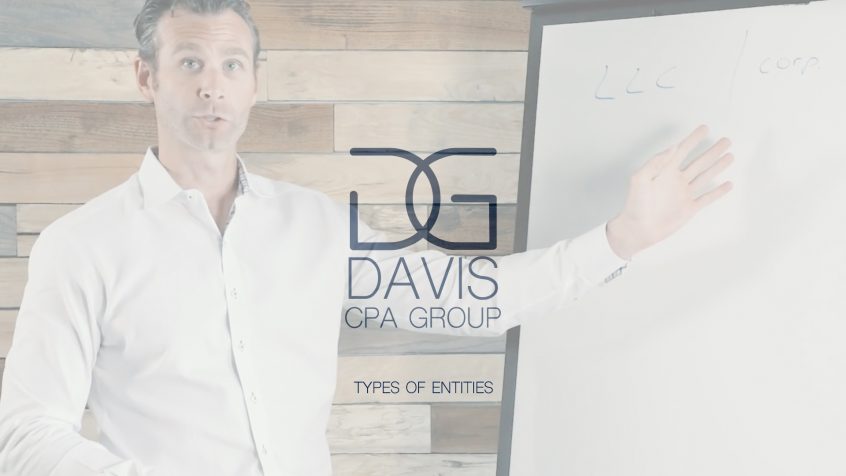Brandon Davis of Davis CPA Group in Joplin, MO, discusses the different types of entities you have available to choose when forming your business. He also discusses the benefits and drawbacks to each. In this video, he covers Corporations, LLCs and Partnerships at a high level.
“Hi, I’m Brandon Davis, owner of Davis CPA Group in Joplin, Missouri. Today I’m going to chat with you all about choice of entity selection. Choice of entity, when setting up a new business, is something that my clients ask me a lot about, so today I thought we’d talk through kind of informally different options of entity that you can select when starting a business and maybe what some of the pros and cons of some of those entities are, and we can kind of go from there.
We’ll jump right into it. A lot of times, people will give me a call and want to set a time to meet to talk about figuring out what is the best business option for them. They usually come to me with some idea of being a corporation or an LLC, and they don’t know what that means. Maybe we can dive into that a little bit further too and talk about that.
One of the things that we like to look at whenever we’re figuring out what entity choice is best is what is the goal of the business? You got to come into it thinking about one, what type of business am I going to be? What am I going to be offering? Is it a product or service? Am I going to own real estate? Am I going to have other investors, other owners? These are all things that come into play. While we talk through some things today at a high level, there’s a lot of details that we’d want to factor in a situation. We figure out the exact perfect entity selection for you, but that’s something we can figure out once you’re ready.
At a high level, the majority of entities that we talk through from a standpoint of entity choices is you’ve got your LLCs, which is a limited liability company. We’ve got corporations, which is basically incorporated entities that you set up with shareholders and things of that nature. We’ve got partnerships.
Basically, there’s three options that you have in looking at a choice of entity. We’ve got LLC, corporation, and a partnership. An LLC is a limited liability company. Those are set up a little bit different than corporations. A corporation is set up … Let me back up. They’re all set up with the Secretary of State’s office when you first create an entity, and we recommend you get an attorney involved in getting the entity created.
An LLC is a little bit less formal than a corporation in that generally you don’t have bylaws and boards of directors and annual reports that you have to file. The LLC basically has members as the owners, and those members can either manage the LLC, or they can hire managers to manage the LLC. Corporations, they have board of directors, they have stockholders, they have officers, presidents, vice presidents, secretaries, treasurers, and that’s generally the structure there.
Partnerships are a little bit looser than these two even further. Partnership entities basically have partners, hence the name partnership, and they come together, and they create an operating agreement that then dictates how things are going to be split up from the standpoint of income, expenses, gains and losses. We also can have a lot more flexibility in a partnership structure in how you allocate those things.
One of the things that we want to look at, just kind of walking through stuff that you want to think about when you’re looking at picking one of these three entities is, one, ease of setup, which again, the LLC is probably the easiest thing to set up. Your corporation is going to be a little bit more complex an operation, and your partnership’s kind of somewhere in the middle.
The second thing you want to think about is what’s my business going to be doing? Am I a service company? Am I going to be a retail organization? Am I going to be a company that just holds real estate as investments? We need to think about what are we going to be doing and what type of business are we going to be, so type of business. That’s got to be considered.
Because one of the things I tell my clients is, if I’m going to hold real estate, I don’t want to be a corporation. There’s some tax reasons that we don’t want to be a corporation, and we’ll get into those at a later point. But if we’re going to be a big retailer or a big manufacturing company and maybe operate in multiple states, maybe we need the more sophisticated corporate structure for liability protection purposes and being able to cross state lines a little bit better and what have you. That’s something you really got to think about.
The third thing you want to think about is ownership. How many owners are you going to have? Are you going to have multiple owners? Are you going to have some owners with different types of interest? Ownership structure is something else that you definitely want to consider.
What I mean by that is I may have a situation where I have owners that share in the profits of the company, and then I’ve got some owners that just want to share in a future return. We could have preferred shares of stock in a corporation. On partnerships, we’d have different types of owners there that either get all or more of the profits versus other owners. And then your LLC has the ability to be a little bit of a hybrid between the two. Ownership structure is important too.
And also, the other thing you need to think about is liability protections. Does the LLC give you the liability protections that you need versus a partnership? A general partnership basically … let me write that down here, liability protection. Again, don’t chastise my spelling or my writing. But liability protection is a big deal. Partnerships, particularly general partnerships, the partners are liable for not only any debts that the partnership has but any claims against the partnership.
For example, if I’m in a partnership with another individual, and we’re in a service business, and they perform a poor service that produces a liability or a claim against our entity, we’re both personally liable to what happens. Whereas a corporation puts a veil of protection around just the actions inside the corporation. The shareholders generally are not liable for any claims or liabilities that are generated. Certainly, with the LLC, you have that structure also or that liability protection, hence the name limited liability company.
Those are some of the things we definitely want to think about whenever you’re creating an entity for the first time: ease of setup, type of business, the ownership structure, and liability protection. I’m happy to talk with anybody about that a little bit further, if this raises more questions for you. We can meet and set a time to discuss that in detail.”


